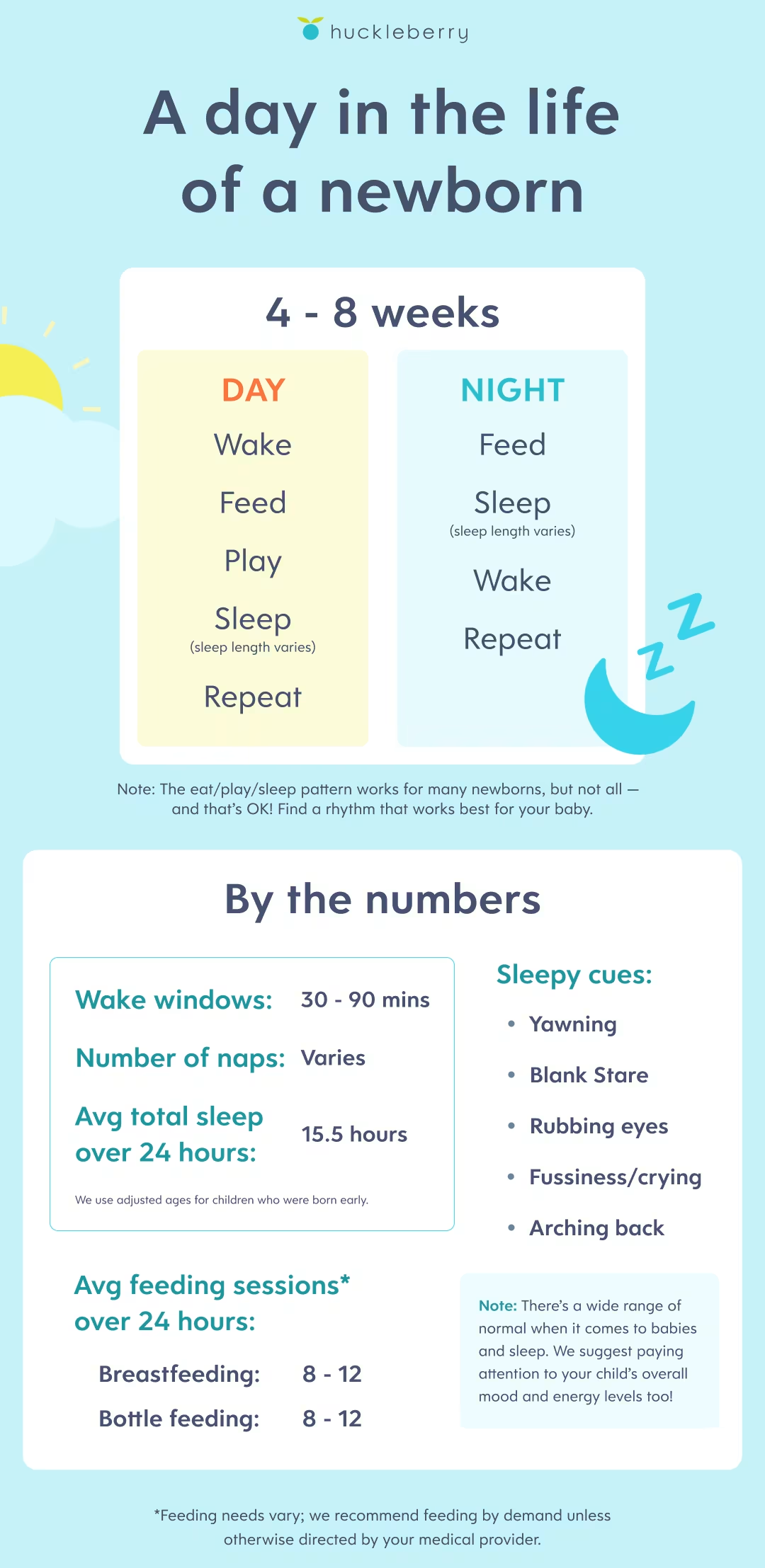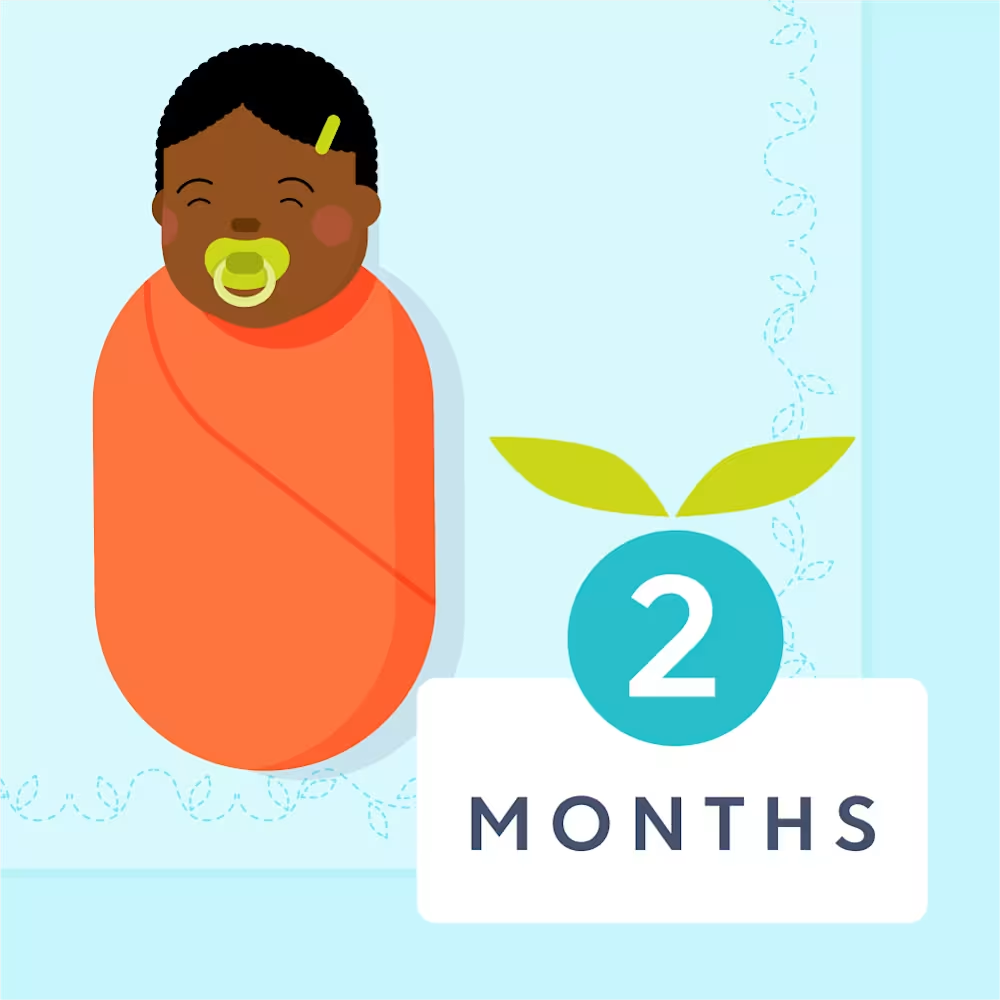1 - 2 month old baby feeding schedule: How much should they eat?
Updated Jan 02, 2026

While a 1 - 2 month old baby is still considered a newborn, you may be settling more into your new role as a parent and caregiver. (And if you aren’t, that’s OK, too! These things take time.) Hopefully, this means feeding has become a bit easier and perhaps a bit more predictable. At this age, babies will continue to drink breast milk, formula or a combination of both on demand.
In this article, we’ll walk you through typical newborn eating schedules and patterns, give you tips for feeding your little one, and answer frequently asked questions about night feeding and more.
How much to feed a 1 to 2 month old
How much should a 1 month old eat?
Feeding frequency | Amount per feeding | Total feedings per day |
|---|---|---|
2 - 3 hours | 2 - 4 ounces | 8 - 12 |
At 1 month old, babies usually eat roughly every 2 - 3 hours. Breastfed babies typically eat more often than formula-fed babies since breast milk digests faster than formula []. Newborns at this age will eat about 2 - 4 ounces at each feeding with roughly 8 - 12 feedings in a 24-hour period. If your baby is back to their birth weight, it’s OK to follow their lead regarding when to feed. Just be sure they are still meeting a minimum of 8 feedings per 24 hours as well as making you change at least 6 pee diapers.
How much should a 2 month old eat?
Feeding frequency | Amount per feeding | Total feedings per day |
|---|---|---|
3 - 4 hours | 2 - 4 ounces | 8 - 12 |
At 2 months, the goal remains the same at about 8 - 12 feedings in a 24-hour period. Routines are starting to develop at this age, but they might still feel a little blurry.
If you’re looking to track your newborn’s feedings, can help! In the app you can log nursing sessions, bottle feeds, pumping sessions, and more.
1 to 2 month old baby sample feeding schedule
At this age, little ones are still calling the shots when it comes to mealtimes. The American Academy of Pediatrics [] recommends following responsive feeding, or feeding on demand, at 1 - 2 months old for most babies. (There may be instances where your little one’s pediatrician recommends otherwise for things like weight gain or medical conditions.)
Think of this as letting your baby be the boss of their own menu. It can swing from days of back-to-back feedings to stretches where your baby surprises you by going longer between meals. Watch for their hunger cues and feed accordingly, rather than using scheduled feedings for your little one. Eating and sleeping are best friends at this age, following closely behind one another.
Here is a sample peek at what a day in the life of a newborn may look like at 1 - 2 months.

Night feedings at 1 to 2 months old
At 1 - 2 months old, babies still need night feedings, though they may be able to sleep for longer stretches at night. Feeding on demand, including overnight, is important to support the rapid growth and development that babies experience. At this age, hunger plays a big — babies wake up when they’re hungry and it's feeding time!
Common feeding challenges for 1 to 2 month old babies
In the early weeks, many babies still have their days and nights mixed up. Close to 2 months of age, you might notice longer stretches between feeds or that your baby settles back to sleep more easily.
Some common hiccups during this stage include:
Mixed-up sleep patterns: More nighttime cluster feeds are common early on.
Reflux and gas: If this is the case, consider paced bottle feeding or burping between breasts when nursing.
Supply changes: Oversupply or low supply can impact feeding rhythms if you’re breastfeeding.
3 tips for feeding your 1 to 2 month old baby
Tip #1: Focus on hunger and fullness cues
It may be tempting to put your baby on an eating schedule based on the clock, but it’s best to continue following their hunger and fullness cues at this age. Responsive feeding [] ensures they eat the amount right for them and sets up good habits. They are learning how their bellies feel when it’s hungry and full – which is a good skill to have in the future, too! Hunger cues [] include licking lips, starting to suck, and fussiness. Fullness cues include turning their head away, closing their mouth, or falling asleep.
Tip #2: Fussiness doesn’t always mean hunger
While fussiness or crying sometimes becomes synonymous with thinking your baby is hungry, this isn’t always the case. Remember, babies use crying or fussiness as a way to communicate, so these behaviors may also signal things like they are tired, too cold or warm, overstimulated, want to be snuggled, or need their diaper changed.
If your baby seems to be in pain, is consistently eating less than usual, and/or is producing fewer wet diapers (less than 6 per day), consider consulting your child's healthcare provider or a lactation consultant.
Tip #3: Breast milk and formula needs increase as babies grow
Just as babies start to be able to go longer between breast milk and formula meals as they grow, feeding amounts typically increase, too. At 1 - 2 months, newborns will likely begin eating more, getting closer to 3 - 4 ounces each feeding. Nursing babies will gradually make this change on their own. However, sometimes bottle-fed babies will want more at each feeding. A way to know it’s time to increase formula or breast milk is when they start finishing their bottles regularly and are still showing signs of hunger.
This might look like:
Rooting around for more after the bottle is empty
Sucking on their hands or smacking their lips right after a feed
Getting fussy shortly after eating
Takeaway
At 1 - 2 months old, babies are still feeding many times during the day to support their rapid growth. Most babies at this age eat every 2 - 3 hours. This puts the number of feeds at around 8 - 12 times during a 24-hour period.
Babies will start to go longer between feeds and eat more at each feed. By the end of the second month of life, many babies will still be eating about 3 - 4 ounces at each feeding but may be able to go up to 4 hours between some feedings.
Feeding on demand is still recommended for most babies at this age. Continue to watch and learn your baby’s hunger and fullness cues. With time, you will find being in tune with their feeding needs becomes easier.
Share article:
Note: The content on this site is for informational purposes only and should not replace medical advice from your doctor, pediatrician, or medical professional. If you have questions or concerns, you should contact a medical professional.
6 Sources
Share article:





